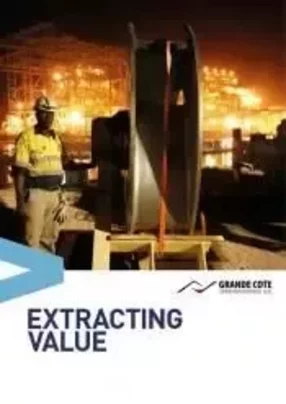Despite only being in operation since the middle of 2014 Mineral Deposits’ Grand Cote Operations (GCO) in Senegal has already proved to the industry that a mining outfit can operate a profitable and productive business while making a positive impact in a developing country. For its formidable achievements in such brief time, GCO received an exclusive invitation to accompany the Senegalese government to last year’s COP21 conference – a well-deserved honour, as we shall explore.
Operations
Listed on the Australian Stock Exchange, Mineral Deposits Limited (MDL) is specialised in mining, integrating, and transforming mineral sands. In partnership with French company ERAMET, MDL owns 50 percent of the TiZir joint venture, which consists of the Grande Côte operation in Senegal, supported by a titanium and iron ilmenite upgrading facility (TTI) in Norway, enabling the extraction and subsequent smelting of mineral sands in a single operation.
Senegal’s Grand Cote Operations span over 445 square kilometres; the orebody present in this region is primarily made up of zircon and ilmenite, but also contains some high value co-products in the form of rutile and leucoxene. With an expected lifetime of just under 30 years (but with additional resources), the mine is set to be profitable for all involved if the correct strategy is adopted.
GCO CEO Daniel Marini explains: “The operation covers a very large area, however due to the nature of the deposit we need to maintain a very elevated throughput; this achievement owes a lot to the largest dredge in the world.”
A series of unique pumps supports this exceptional piece of equipment that moves the extracted ore to a floating Wet Concentrator Plant which separates the mineral deposits from the surrounding sand. The resulting product is then driven to a dedicated mineral separation plant. Once fully processed at the Mineral Sand Process plant, the mineral sand travels via rail to GCO’s dedicated dock at the Port of Dakar.
Marini explains how a range of control measures certify that the minerals GCO ships are of the highest quality: “We have a laboratory operated by a technician with a Masters in Chemistry who takes hundreds of samples every single day. This ensures our product is free from pollutants and is up to international standards.”
Strategy
GCO’s scientific approach applies far beyond geology, hydrogeology, and metallurgy, involved in mineral grading – every aspect of its operations is calculated to deliver the most value - from shareholders to the surrounding communities. Even Marini’s appointment as CEO just over a year ago was a decision based on his broad professional experience and technical capabilities.
He says: “I earned a PhD in Geology and in Mining. I worked for the UN DP in Djibouti as a geologist and hydrogeologist. I also worked on a World Bank project in North Cameroon surveying over 400 villages for water, as well as in several executive roles (geologist, mining engineer and metallurgist) for mining companies part of Eramet Group.
Operating a successful business in Africa does not come without its challenges but, as Marini explains, the government of Senegal (which owns a 10 % stake in GCO) has proved to be asset to GCO’s operations: “The Senegalese government is open to those looking to develop industrial operations in the country - they want to have a mining industry and are prepared to make mining into a profitable business.
“When we needed to speak to a government official, their doors were always open – perhaps more so than in other African countries. There’s a level of respect, not solely from ministers, but from the people living near our operations as well. Senegal is a country with a culture of education and skilled individuals.”
He also explains that GCO recently hired an external auditor to examine the entirety of its supply chain operations in order to find savings and promote efficiency. While this is yet to be fully completed, it is increasingly likely that the company will be looking to simplify its logistics operations enabling it to work with a smaller number of providers and therefore streamline many of its processes. Like many others mining company, with dropping commodity prices, GCO has engaged in a process of optimising all of these costs.
Positive impact
Far from ignoring its role as a key employer in the Grande Cote region, GCO made a number of commitments which will ensure its successful operations benefit both its employees – a mixture of locals and expatriates – and the communities touched by its work. Taking the relatively long life-span of the mine into account, the company worked hard to make sure that its CSR work leaves a lasting, long-term impact.
Marini expands: “We have the potential to make a huge impact – out of the 800 people we employ, 740 of them are locals; our operations, directly and indirectly, are responsible for employing a total of 2,000 people. Alongside the training we provide on-site, we also take the brightest local people and give them top professional training across numerous European institutions.”
GCO also left a permanent mark on the area, by constructing a resettlement village for the local people; where there were once temporary structures, now stand concrete buildings, supplied with piped water and powered by solar panels.
With the hereinabove initiatives, the company seeks to develop local economies and prove to the entire industry that ethical extraction is very much within reach. By challenging itself to do as much as it possibly can for local communities, it is not only improving living standards but also playing a major role in fostering Senegal’s local extraction talent. Furthermore, GCO is showing that Senegal is a country with a healthy business environment and an investment-friendly environment.


